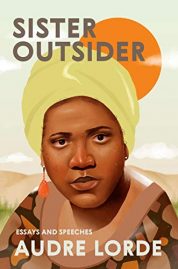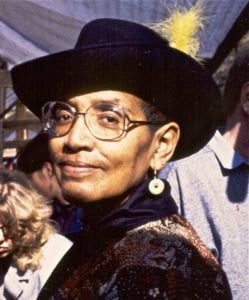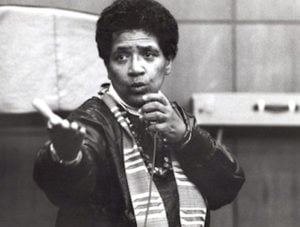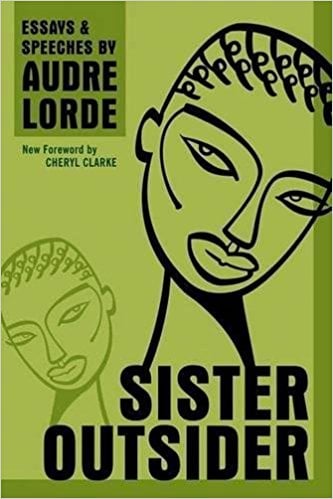10 Thought-Provoking Quotes from Sister Outsider by Audre Lorde
By Taylor Jasmine | On September 30, 2017 | Updated December 11, 2022 | Comments (0)

Sister Outsider is collection of essays and speeches by Audre Lorde (1934 – 1992), the highly influential writer, speaker, and teacher, self-identified as a Black lesbian poet, and feminist. The thought-provoking quotes from Sister Outsider presented here bear witness to the depth of Lorde’s commitment to feminism and justice.
This posthumously published compilation features fifteen essential essays and speeches in which Lorde delves into sexism, racism, homophobia, and other oppressions. As demonstrated by the quotes from Sister Outsider that follow, Lorde provides a roadmap for social transformation that begins with change within the individual.
Though most of the essays in were written in the 1970s and 1980s, the struggles are all too much with us, making her writing and thinking as relevant as ever.
An essay by Antoinette Dwandu in the Los Angeles Review of Books bears this out eloquently, highlighting the importance of Lorde’s words in the wake of the Charlottesville incident of 2017, especially the constructive use of anger:
“As with any nurturing work, teaching forces us to confront our best and worst selves, especially when those we aim to instruct look, talk, and act a lot like we do. Lorde, who was also a teacher and activist and who died of liver cancer in 1992, argues that black women “have learned to neutralize [our nation’s antiblackness] through ourselves [in a] catabolic process [that] throws off waste products of fury even when we love.”
As I recall my teaching years, the implication of Lorde’s essay is clear: black women must continually reappropriate the energy of our fury into a creative life-force whose power instructs us to mother ourselves and one another. Black girl magic, indeed.”
In her still-relevant 1983 Introduction to Sister Outsider, Nancy K. Bereano, who assisted in shaping the collection, recalled: “Audre Lorde informed me, as we were working one afternoon, that she doesn’t write theory. ‘I am a poet,’ she said.” And still, Bereano continued:
“Lorde’s stature as a poet is undeniable. And yet there can be no doubt that Sister Outsider, a collection of essays and speeches drawn from the past eight years of the Black feminist’s nonfiction prose, makes absolutely clear to many what some already knew: Audre Lorde’s voice is central to the development of contemporary feminist theory. She is at the cutting edge of consciousness.
… Lorde’s work expands, deepens, and enriches all of our understandings of what feminism can be.”
. . . . . . . . . .
Poetry is not a Luxury
“For women … poetry is not a luxury. It is a vital necessity of our existence. It forms the quality of light within which we predicate our hopes and dreams toward survival and change, first made into language, then into idea, then into more tangible action. Poetry is the way we helped give name to the nameless so it can be thought. The farthest horizons of our hopes and fears are cobbled by our poems, of our daily lives.”
. . . . . . . . . .
Transformation of Silence
“For those of us who write, it is necessary to scrutinize not only the truth of what we speak, but the truth of that language by which we speak it. For others, it is to share and spread also those words that are meaningful to us. But primarily for us all, it is necessary to teach by living and speaking those truths which we believe and know beyond understanding.”
. . . . . . . . . .
See also: 5 Politically-Inspired Poems by Audre Lorde
. . . . . . . . . .
Scratching the Surface
“As Black women we have the right and responsibility to define ourselves and to seek our allies in common cause: with Black men against racism, and with each other and white women against sexism. But most of all, this Black women we have the right and responsibility to recognize each other without fear and to love where we choose. Both lesbian and heterosexual black women today share a history of bonding and strength to which our sexual identities and another differences must not blind us.”
. . . . . . . . . .
Uses of the Erotic: The Erotic as Power
“There are many kinds of power, use and unused, acknowledged or otherwise. The erotic is a resource within each of us that lives in a deeply female and spiritual plane, firmly rooted in the power of our unexpressed or unrecognized feeling … is the erotic offers a wealth of replenishing an provocative force to the woman does not fear its revelation, nor come to the belief that sensation is enough.”
. . . . . . . . . .
You might also like: 5 Reasons to Love Audre Lorde
. . . . . . . . . .
Man Child: A Black Lesbian Feminist’s Response
“The truest direction comes from inside. I give the most strength to my children by being willing to look within myself, and by being honest with them about what I find there, without expecting a response beyond their years. In this way they begin to look beyond their own fears.”
. . . . . . . . . .
The Master’s Tools Will Never Dismantle the Master’s House
“For women, the need and desire to nurture each other is not pathological but redemptive, and it is within that knowledge they our real power is rediscovered. It is this real connection which is so feared by a patriarchal world. Only within a patriarchal structure is maternity the only social power open to women.”
. . . . . . . . . .
Age, Race, Class, and Sex
“… our future survival is predicated upon her ability to relate within equality. As women, we must root out internalized patterns of oppression within ourselves if we are to be on the most superficial aspects of social change. Now we must recognize differences among women who are our equals, neither inferior or superior, and devise ways to use each others’ difference to enrich the visions and our joint struggles.”
. . . . . . . . . .
Uses of Anger
“Any discussion among women about racism must include the recognition and the use of anger. This discussion must be direct and creative because it is crucial. We cannot allow our fear of anger to deflect us nor seduce us into settling for anything less then the hard work of excavating honesty …”
. . . . . . . . . .
. . . . . . . . . .
Learning from the 60s
“Decisions to cut aid for the terminally ill, for the elderly, for dependent children, for food stamps, even school lunches, are being made by men with full stomachs who lives in comfortable houses with two cars and umpteen tax shelters. None of them go hungry to bed at night.”
. . . . . . . . . .
Eye to Eye
“America’s measurement of me has lain like a barrier across the realization of my own powers. It was a barrier which I had to examine and dismantle, piece by painful piece, in order to use my energies fully and creatively. It is easier to deal with the external manifestations of racism and sexism then it is to deal with the results of those distortions internalized within our consciousness of ourselves and one another.”



Leave a Reply